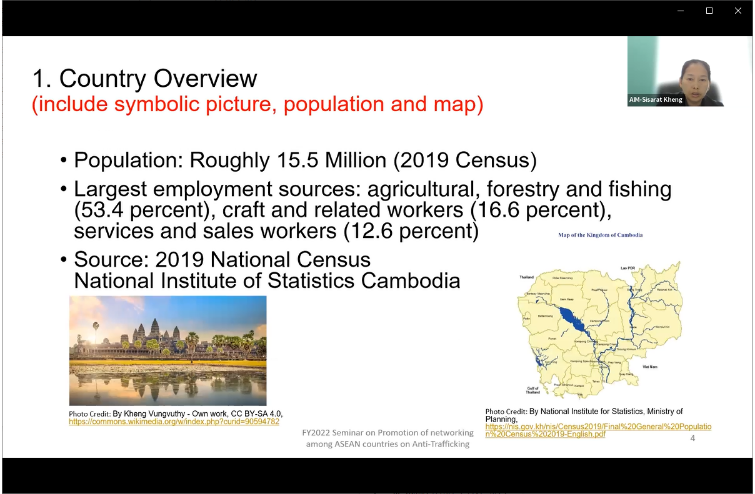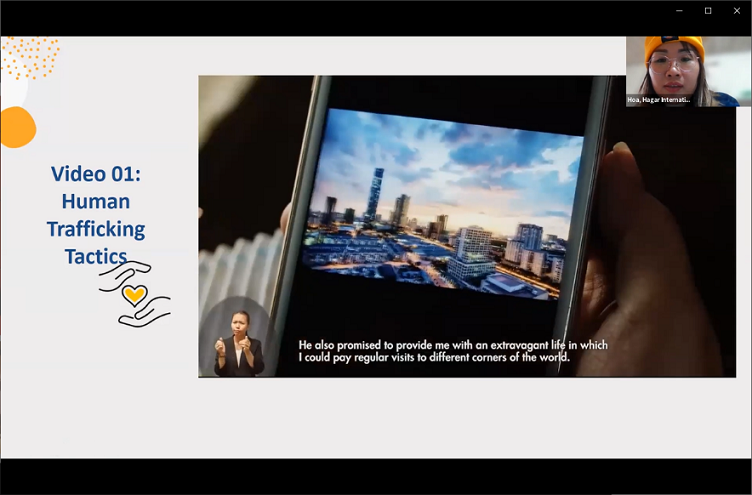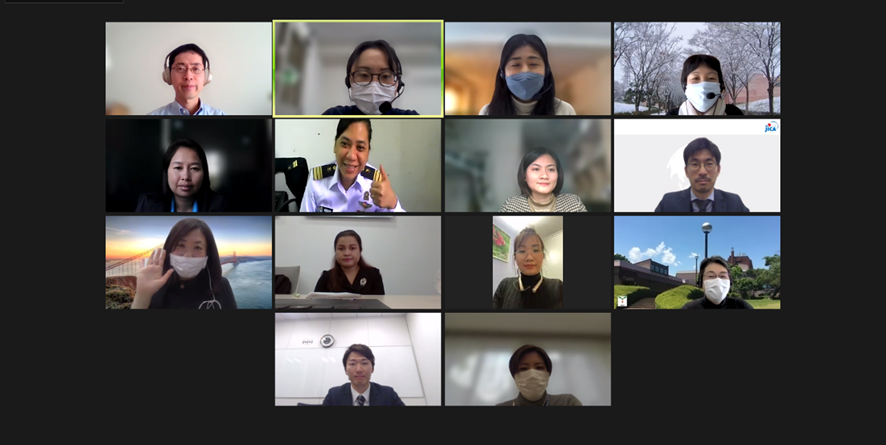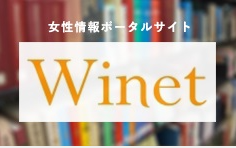Cooperation with JICA
- HOME
- International Cooperation
- Cooperation with JICA
- FY2022 Knowledge Co-creation Program "Promotion of Networking among ASEAN Countries on Anti-Trafficking in Persons”
Cooperation with JICA
- Event Report
-
FY2022 Knowledge Co-creation Program "Promotion of Networking among ASEAN Countries on Anti-Trafficking in Persons”
Date:December 2, 2022 to January 31, 2023
The National Women’s Education Center (NWEC) offered a seminar entitled “Promotion of Networking among ASEAN Countries on Anti-Trafficking in Persons” during the period from December 2, 2022, to January 31, 2023, as a project commissioned by the Japan International Cooperation Agency (JICA).
This year again, from the standpoint of preventing the spread of COVID-19, the seminar was held online. Five administrative officials at central and local government agencies and NGO staff mainly in charge of prevention and protection against trafficking in persons in three ASEAN countries (Cambodia, Malaysia, and Vietnam) participated in the seminar.
This seminar deepened mutual understanding about each country’s efforts to combat trafficking in persons, and in particular, to get a better picture of the roles and frameworks for cooperation among related organizations engaging in prevention and protection of victims. The objective was to have participants discuss measures that would contribute to strengthening the functions of organizations involved in measures against trafficking in persons, and cooperation among them, as well as to strengthening cross-border networking.
Although the participants joined while engaged in their normal work duties, they received lectures on measures taken by other countries including those of the Japanese government, the current state of cyber trafficking, how support should be provided from the perspective of victims, and efforts to improve the conditions that foreign workers face while working in Japan, among other topics. The participants exchanged opinions on building a relationship of trust with victims, cooperation with related organizations, strengthening the capability of supporters, creating a system that prevents the exhaustion of supporters, etc.
On-demand Learning and Orientation
On-demand learning started from December 2, with seven videos on initiatives by the Cabinet Secretariat, Tokyo Metropolitan Women’s Consultation Center, International Organization for Migration (IOM), JICA, and the “Japan Platform for Migrant Workers towards Responsible and Inclusive Society (JP-MIRAI).” On January 11, an online live orientation was conducted by connecting participants’ countries from the NWEC conference room via Zoom. Following self-introductions and an introduction on JICA’s initiatives, the participants shared the overall situation of trafficking in persons in their countries as well as the challenges they face in their daily work.
 Sharing issues on trafficking in persons in each country through the online worksheet
Sharing issues on trafficking in persons in each country through the online worksheet
January 12 (Thu) and 17 (Tue): Hardships Caused by Trafficking in Persons and Countermeasures Shared by Each Country
Over the two days, participants shared the victims of trafficking in persons and countermeasures in their respective countries using materials prepared in advance by the participants. From Thailand, a peer support group (Live Our Lives, LOL), cooperating with JICA, introduced their activities. Participants shared issues they faced including: gathering highly reliable data and strengthening cooperation with related organizations to provide support for poor and households vulnerable to trafficking in persons; inadequate telephone support provided for victims who speak foreign languages; lack of shelters leads to protected victims repeatedly failing to become financially independent ending in involvement in trafficking in persons; prejudice making trafficked victims unable to rejoin their communities and becoming isolated; the definition of trafficking in persons in their countries deviating from international standards making it difficult to determine whether victims should be protected or handled as illegal immigrants; and law enforcement authorities having insufficient awareness of issues of trafficking in persons limit the number of cases that can be protected; among other issues.


Presentations from each country on harm from trafficking in persons and countermeasures
January 12 (Thu), 17 (Tue), and 18 (Wed): Case Reports from Japan and Exercise
Reports from Japan included an overview of public support such as victim protection by the Tokyo Metropolitan Women’s Consultation Center and IOM in addition to case studies in the US of support for victims of trafficking in persons of Thai nationality and examples of training of trainers (TOT) by JICA in a victim-centered approach in Myanmar to support victims of trafficking in persons and cases of harm from cyber trafficking of persons. The importance of education about the increasing harm from cyber trafficking and continuing dialogue to create relationships of trust, strengthening the capability of supporters to provide support from the perspective of victims, building a relationship of trust with victims, and self-care as fundamental to high-quality support to prevent exhaustion on the part of supporters were shared.
Given the issues of Japan’s immigration control system for foreign workers, the JP-MIRAI platform was introduced. Questions from the participants about JP-MIRAI’s collaboration with the private sector led to sharing how the companies’ responsibility to protect the working environment of foreign workers, including technical intern trainees, as human rights are attracting attention.
In a group exercise, participants confirmed what they had learned through the lectures and exchange of opinions.
 Participants exchanging opinions using the online worksheet
Participants exchanging opinions using the online worksheet
January 31 (Tue): Final Presentations and Evaluation Session
As the final presentation, action plans by participants were presented including how to apply the learning from this seminar to their future work. In their presentations, adding awareness and education on harm from trafficking in persons and countermeasures to existing training and awareness-raising activities, utilizing external funds, human resources, know-how, and networks by strengthening cooperation with other ministries and NGOs, and the aspiration to continue dialogue from the standpoint of victims and place importance on building trust were shared.
As trafficking in persons is a serious crime committed across borders, the participants expressed their desire to further strengthen their networks in the future. To make steps toward the realization of this goal, a social media group page was established to maintain the network among the participants. In addition, the outcomes of this seminar will be used in a workshop co-sponsored by JICA and the Thai government on countermeasures against trafficking in persons in the Mekong region as well as in projects on trafficking in persons JICA is developing in the ASEAN region.

Lastly, we sincerely thank all individuals who offered a great deal of cooperation in carrying out this online seminar.
International Cooperation
- International Seminar
- FY2019 Seminar for Gender Equality Officers and Women Leaders in the Asia Region
- FY2018 Seminar for Gender Equality Officers and Women Leaders in the Asia Region
- FY2017 Seminar for Gender Equality Officers and Women Leaders in the Asia Region
- FY2016 Seminar for Gender Equality Officers and Women Leaders in the Asia Region
- FY2015 Seminar for Gender Equality Officers and Women Leaders in the Asia Pacific Region
- FY2014 Seminar for Gender Equality Officers and Women Leaders in the Asia Pacific Region
- FY2013 Seminar for Gender Equality Officers and Women Leaders in the Asia Pacific Region
- FY2012 Seminar for Gender Equality Officers and Women Leaders in the Asia Pacific Region
- FY2011 Seminar for Gender Equality Officer and Women Leaders in the Asia Pacific Region
- FY2010 Empowerment Seminar for Women Leaders in the Asia Pacific Region
- FY2009 Empowerment Seminar for Women Leaders in the Asia Pacific Region Final Report
- FY2008 Empowerment Seminar for Women Leaders in the Asia Pacific Region
- FY2007 Empowerment Seminar for Women Leaders in the Asia Pacific Region
- FY2006 Empowerment Seminar for Women Leaders in the Asia Pacific Region
- NWEC Global Seminar
- FY2025 NWEC Global Seminar: Addressing Technology-Facilitated Gender Based Violence (TFGBV): Approaches to Eradicate the Invisible Harm
- FY2024 NWEC Global Seminar: Gender Equality and Care
- FY2023 NWEC Global Seminar: Gender Mainstreaming & Strengthening Institutional Mechanism with Gender Perspective
- FY2022 NWEC Global Seminar: Does Digital Technology Advance Gender Equality?
- FY2021 NWEC Global Seminar: Combating Gender-Based Violence – “Building Back Better” from the Covid-19 Crisis
- FY2020 NWEC Global Seminar: Covid-19 and Gender
- FY2019 NWEC Global Seminar: Gender and Media
- FY2018 NWEC Global Seminar: Promotion of the Advancement of Women - What Japan can learn from Iceland about Gender Equality?
- FY2017 NWEC Global Seminar: Promotion for Advancement of Women Lessons from Germany
- FY2016 NWEC Global Seminar: Promotion for Advancement of Women –Lessons from Europe
- FY2015 International Symposium: Gender Equality and Women's Empowerment
- FY2014 International Symposium: Keys to Diversity and Women's Leadership
- FY2013 NWEC International Symposium:Gender Equality for Men
- FY2012 NWEC International Symposium:To Make a Society without Violence against Women a Reality
- FY2011 NWEC International Symposium
- FY2010 International Forum for Women's Empowerment
- FY2009 International Forum for Women's Empowerment
- FY2008 International Forum for Women's Empowerment Final Report3
- FY2008 International Forum for Women's Empowerment Final Report2
- FY2008 International Forum for Women's Empowerment Final Report1
- Cooperation with JICA
- FY2025 Knowledge Co-Creation Program (KCCP): "Promotion of Global Networking on Anti-Trafficking in Persons"
- FY2025 Knowledge Co-Creation Program "Eradicating Sexual and Gender-Based Violence (SGBV)"
- FY2025 Knowledge Co-Creation Program: Bangladesh “Strengthening Capacity to Address Gender-Based Violence"
- FY2024 Knowledge Co-Creation Program on "Promotion of Global Networking on Anti-Trafficking in Persons"
- FY2024 Knowledge Co-Creation Program "Eradicating Sexual and Gender-Based Violence (SGBV)"
- FY2023 Knowledge Co-creation Program "Promotion of Networking among ASEAN Countries on Anti-Trafficking in Persons”
- FY2023 Knowledge Co-Creation Program "Eradicating Sexual and Gender-Based Violence (SGBV)"
- FY2022 Knowledge Co-creation Program "Promotion of Networking among ASEAN Countries on Anti-Trafficking in Persons”
- FY2022 Knowledge Co-Creation Program "Eradicating Sexual and Gender-Based Violence (SGBV)"
- FY2021 Knowledge Co-creation Program "Promotion of Networking among ASEAN Countries on Anti-Trafficking in Persons”
- FY2020 Knowledge Co-creation Program "Promotion of Networking among ASEAN Countries on Anti-Trafficking in Persons”
- FY2019 Knowledge Co-creation Program "Promotion of Networking among ASEAN Countries on Anti-Trafficking in Persons”
- FY2018 Knowledge Co-creation Program "Promotion of Networking among ASEAN Countries on Anti-Trafficking in Persons”
- Issue-specific Training “Seminar on Promotiom of Networking among ASEAN Countries on Anti-Trafficking in Persons”
- Basic Information-Gathering Survey/Workshop Seminar on the Economic Independence for Women in Central America and the Caribbean (El Salvador/Dominican Republic)
- Regional Gender Seminar in Central and South America
- 2015 Issue-specific Training "Seminar on Promotion of Networking among Asian Countries on Anti-Trafficking in Persons"
- Seminar on the Promotion of Education for Girls and Women II
- International Conference/International Exchange
- Online meeting with Seisen International School elementary students
- Visitor: Mansfield Fellows
- Visitor:JICA Knowledge Co-Creation Program (KCCP) on "Women's Empowerment through Business for Central American Integration System (SICA) Member Countries"
- The 68th Session of the Commission on the Status of Women
- Visitor: Madam Sustjie Mbumba, First Lady of the Republic of Namibia
- Workshop of commemorating the donation of the Beate Shirota Gordon archive materials
- Meeting with Korean Women’s Development Institute (KWDI)
- The Coalition of Finnish Women's Associations (NYTKIS) Secretary General Ms. KAKKOLA’s Courtesy Call to Foreign Minister KAMIKAWA
- The Coalition of Finnish Women's Associations (NYTKIS) Secretary General Ms. KAKKOLA’s Japan Visit Program
- The 67th Session of the Commission on the Status of Women
- NGO CSW67 Forum
- Webinar with Korean Women’s Development Institute (KWDI)
- The 66th Session of the Commission on the Status of Women (Hybrid format)
- Online meeting with international graduate students from the Appropriate Technology course at the University of Tsukuba
- The 65th session of the Commission on the Status of Women
- Lecture "The Beate Sirota Gordon Archives at Mills College"
- Participation in 2nd AGenT
- The 64th session of the Commission on the Status of Women
- Dr. Wang from National Taiwan University visits NWEC
- Japan Network of Women Engineers and Scientists and The Japan Inter-Society Liaison Association Committee for Promoting Equal Participation of Men and Women in Science and Engineering: 9th Japan Korea China Women Leaders Forum for Science & Technology
- Researcher from the KWDI visits NWEC
- Visit by a delegation from the Socialist Republic of Vietnam Ministry of National Defense
- Briefing on the Reykjavik Index for Leadership
- Women's Archives Center Exhibition "Beate Sirota Gordon and gender equality in Japanese Constitution"
- Visit from the Guangxi Women’s Federation
- Participation in the 63rd Session of the Commission on the Status of Women
- 7th Global Forum on Gender Statistics
- FY2018 International Symposium hosted by Korean Institute for Gender Equality Promotion and Education “Gender Equality at Schools”
- Visit from All-China Women’s Federation(ACWF)
- Participation in the 62nd Session of the Commission on the Status of Women
- The 14th KIGEPE International Symposium “Empowering Women’s Leadership: expanding influence and innovation”
- Participation in the 61st Session of the Commission on the Status of Women
- Visit from the Batis Center for Women
- 2011 Asia Women Eco-Science Forum (a forum of science and engineering leaders in Japan, China and Korea)
- The 60th Session of the Commission on the Status of Women
- The 59th Session of the United Nations Commission on the Status of Women
- The 58th Commission on the Status of Women
- The 57th Session of the United Nations Commission on the Status of Women
- International Symposium: Gender Awareness Education for Sustainable Development
- Thirtieth Anniversary Programs
- Attendance at the Ceremony Commemorating the 25th Anniversary of the Korean Women’s Development Institute (KWDI)
- Japanese-Filipino children (JFC)* from the Philippines-based NGO “DAWN” visit the Center
- Visitors from Abroad to NWEC
- Research report on Multicultural Family Support in South Korea
- Workshop on Gender and Education: Life-long Learning for Women’s Empowerment
- Lecture Delivered by a Visiting Researcher
- Connections: Bringing Together the Next Generation of Women Leaders in Science, Technology, Engineering and Mathematics
- Conclusion of Memorandum of Understanding on Exchange and Cooperation with the Ministry of Women's Affairs, Royal Government of Cambodia
- Visit to Japan by the Minister of Women’s Affairs of the Royal Government of Cambodia
- KIGEPE Delegation Visit
- Officials of Ministry of Information and Communications of the Socialist Republic of Vietnam visited NWEC
- The 56th Commission on the Status of Women
- Dr. Barker's visit
- Multidisciplinary Intellectual Exchange for Women Leaders from the United States, Japan, South Korea and the Philippines
- Courtesy visit to University of Hawai`i
- Delegation of Board for the Advancement of Women, Ministry of Finance of the Socialist Republic of Vietnam visited NWEC
- Visit Korean Women's Development Institute (KWDI)
- Report on Participation in the 5th World Social Forum on Migration
- A group led by the Vice President of the Korean Women's Development Institute visited NWEC
- A disaster management specialist from India visits the Center
- Visit to the Korean Institute for Gender Equality Promotion & Education (KIGEPE) and others
- Secretary of State, Ministry of Justice, Kingdom of Cambodia visited NWEC
- Research conducted in the Republic of the Philippines
- Research on the Comparative Study of the Gender Equality Policy in Southeast Asian Countries in the Kingdom of Cambodia
- Ochanomizu University and A Canadian Women’s Study Researcher visited NWEC
- Aigyung Yang, Research Fellow and Former Director of Strategy Board for Women Friendly Policies of the Korean Women's Development Institute (KWDI) Visits NWEC
- Delegation of the Ministry of Defense of the Socialist Republic of Vietnam visited NWEC
- Delegation from the Women and Development Center, of the Vietnam Women's Union, Visited NWEC
- The "7th Asia-Pacific Forum on Development and Gender" was held in Seoul, South Korea
- HOME
- International Cooperation
- Cooperation with JICA
- Cooperation with JICA
- FY2022 Knowledge Co-creation Program "Promotion of Networking among ASEAN Countries on Anti-Trafficking in Persons”


